Analyse vs. Analyze — What's the Difference?
By Tayyaba Rehman — Updated on October 3, 2023
Analyse" and "Analyze" both mean to examine in detail, but "Analyse" is British English while "Analyze" is American English.

Difference Between Analyse and Analyze
Table of Contents
ADVERTISEMENT
Key Differences
Analyse and Analyze share the same meaning: to examine in detail the structure or elements of a particular subject, often for interpretation or knowledge gathering. The distinction between them lies primarily in their usage in different forms of English.
Employing Analyse is characteristic of British English, which permeates not just the UK, but also countries like Australia, New Zealand, and South Africa. In these regions, "analyse" would be the conventional spelling in academic, professional, and everyday contexts.
Conversely, Analyze is the preferred spelling in American English, embraced in the United States and any international or academic contexts adhering to US spelling conventions. When publishing in American journals or writing for US-based media, "analyze" is the standard spelling.
Remarkably, while Analyse and Analyze are spelled differently, their pronunciation remains largely the same. In both American and British English, speakers would generally understand the term, regardless of its spelling.
Though English speakers worldwide understand both Analyse and Analyze, maintaining the respective spelling for each English form ensures precision and adherence to regional linguistic norms, safeguarding effective communication and observance of correct spelling practices.
ADVERTISEMENT
Comparison Chart
Spelling
Used in British English and its variants.
Used in American English.
Usage
Common in the UK, Australia, and other Commonwealth nations.
Predominant in the United States.
Pronunciation
Generally the same as “analyze”.
Generally the same as “analyse”.
Meaning
No difference in meaning.
No difference in meaning.
Global Recognition
Widely recognized and understood globally.
Widely recognized and understood globally.
Compare with Definitions
Analyse
Examine methodically and in detail.
Scientists analyse the data from the experiments.
Analyze
Scrutinize for the sake of drawing conclusions.
We should analyze the survey results carefully.
Analyse
Examine with the intention to interpret.
The teacher asked the students to analyse the poem.
Analyze
Interpret and identify patterns or details.
The author analyzes changes in societal norms.
Analyse
Conduct a detailed examination or interpretation.
She will analyse the impact of this policy.
Analyze
Study closely for the purpose of explanation.
The professor will analyze the economic system.
Analyse
Breakdown a subject into its elements.
Researchers analyse the substance to find its components.
Analyze
To examine methodically by separating into parts and studying their interrelations.
Analyse
Investigate the implications or composition of a topic.
We need to analyse the financial repercussions.
Analyze
(Chemistry) To make a chemical analysis of.
Analyse
Variant of analyze.
Analyze
(Mathematics) To make a mathematical analysis of.
Analyse
Standard spelling of analyze
Analyze
To psychoanalyze.
Analyse
Same as Analyze, Analyzer, etc.
Analyze
(transitive) To subject to analysis.
Analyse
Consider in detail and subject to an analysis in order to discover essential features or meaning;
Analyze a sonnet by Shakespeare
Analyze the evidence in a criminal trial
Analyze your real motives
Analyze
(transitive) To resolve (anything complex) into its elements.
Analyse
Break down into components or essential features;
Analyze today's financial market
Analyze
(transitive) To separate into the constituent parts, for the purpose of an examination of each separately.
Analyse
Make a mathematical, chemical, or grammatical analysis of; break down into components or essential features;
Analyze a specimen
Analyze a sentence
Analyze a chemical compound
Analyze
(transitive) To examine in such a manner as to ascertain the elements or nature of the thing examined; as, to analyze a fossil substance, to analyze a sentence or a word, or to analyze an action to ascertain its morality.
Analyse
Subject to psychoanalytic treatment;
I was analyzed in Vienna by a famous psychiatrist
Analyze
To subject to analysis; to resolve (anything complex) into its elements; to separate into the constituent parts, for the purpose of an examination of each separately; to examine in such a manner as to ascertain the elements or nature of the thing examined; to consider in detail in order to discover essential features or meaning; as, to analyze an action to ascertain its morality; to analyse a sonnet by Shakespeare; to analyse the evidence in a criminal trial; to analyse your real motives.
No one, I presume, can analyze the sensations of pleasure or pain.
Analyze
Make a mathematical, chemical, or grammatical analysis of; break down into components or essential features; as, to analyse a specimen; to analyze a fossil substance; to analyze a sentence or a word; to analyse a chemical compound.
Analyze
Subject to psychoanalytic treatment.
Analyze
Consider in detail and subject to an analysis in order to discover essential features or meaning;
Analyze a sonnet by Shakespeare
Analyze the evidence in a criminal trial
Analyze your real motives
Analyze
Make a mathematical, chemical, or grammatical analysis of; break down into components or essential features;
Analyze a specimen
Analyze a sentence
Analyze a chemical compound
Analyze
Break down into components or essential features;
Analyze today's financial market
Analyze
Subject to psychoanalytic treatment;
I was analyzed in Vienna by a famous psychiatrist
Analyze
Investigate systematically to understand structure or function.
The lab will analyze the DNA sample.
Analyze
Examine critically for meaning or explanation.
The book analyzes the development of language.
Common Curiosities
Are "analyse" and "analyze" synonymous?
Yes, they are synonymous but are used in British and American English respectively.
Is “Analyse” the same as “Analyze”?
Yes, "Analyse" and "Analyze" have the same meaning but are used in different forms of English.
What does “Analyze” mean?
"Analyze" means to examine something in detail to understand it better or draw conclusions from it.
Is the pronunciation different between “Analyse” and “Analyze”?
No, "Analyse" and "Analyze" are usually pronounced the same.
Is there any difference in pronunciation between "analyse" and "analyze"?
Generally, there is no noticeable difference in pronunciation between the two.
Which one is correct: “Analyzer” or “Analyser”?
“Analyzer” is used in American English, and “Analyser” is used in British English.
Can "analyse" and "analyze" be used interchangeably in international contexts?
While understood globally, it's recommended to adhere to region-specific spelling in formal writing.
Where is "Analyze" predominantly used?
"Analyze" is commonly used in American English.
Can I use "Analyze" and "Analyse" interchangeably?
While understood globally, it’s best to use "Analyze" in American contexts and "Analyse" in British contexts to adhere to spelling norms.
Is “Analysing” the British English equivalent of the American English “Analyzing”?
Yes, “Analysing” is used in British English and “Analyzing” in American English, both referring to the act of examination in present continuous tense.
Can you give an example sentence using "Analyze"?
Certainly: "The scientist will analyze the sample for any abnormalities."
Where is “Analyse” predominantly used?
“Analyse” is predominantly used in British English.
What is the adjective form derived from "Analyse"?
The adjective form derived from "Analyse" is "Analytical."
Does "Analyzing" refer to the present continuous tense of "Analyze"?
Yes, "Analyzing" means examining or evaluating something in the present context.
Is it correct to say "Analyse the data"?
Yes, it is correct and commonly used, especially in British English.
What is meant by "Analytical thinking"?
"Analytical thinking" refers to the ability to scrutinize and break down information into smaller parts to solve problems.
What is the noun form of "Analyze"?
The noun form of "Analyze" is "Analysis."
Can "Analyze" be used in various contexts like science, literature, and psychology?
Yes, "Analyze" can be used in multiple contexts to denote detailed examination or study.
Share Your Discovery

Previous Comparison
Neigh vs. Nay
Next Comparison
Jeez vs. GeezAuthor Spotlight
Written by
Tayyaba RehmanTayyaba Rehman is a distinguished writer, currently serving as a primary contributor to askdifference.com. As a researcher in semantics and etymology, Tayyaba's passion for the complexity of languages and their distinctions has found a perfect home on the platform. Tayyaba delves into the intricacies of language, distinguishing between commonly confused words and phrases, thereby providing clarity for readers worldwide.
















































